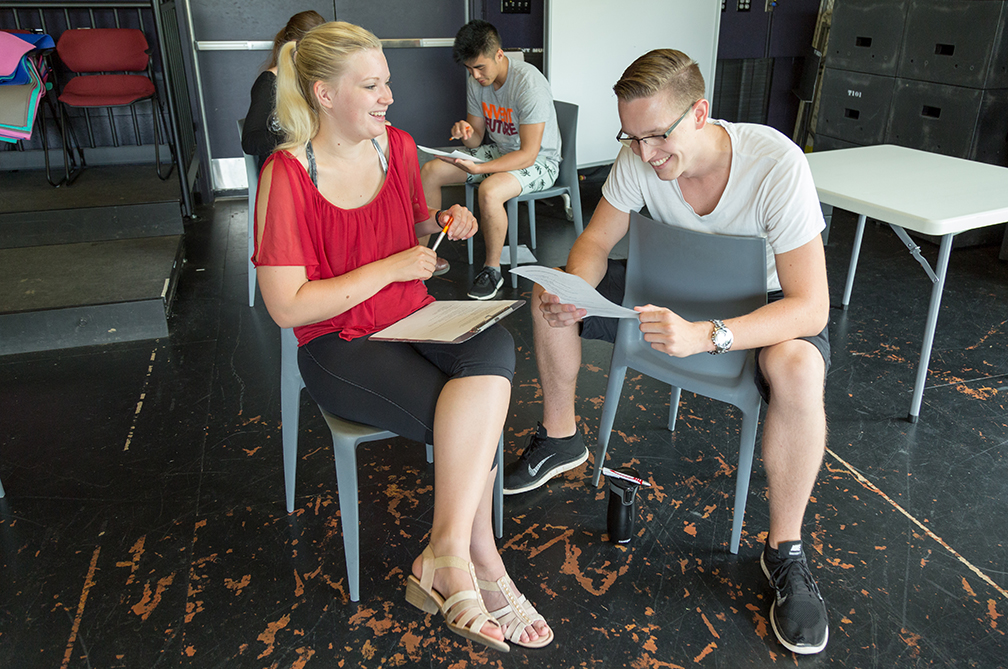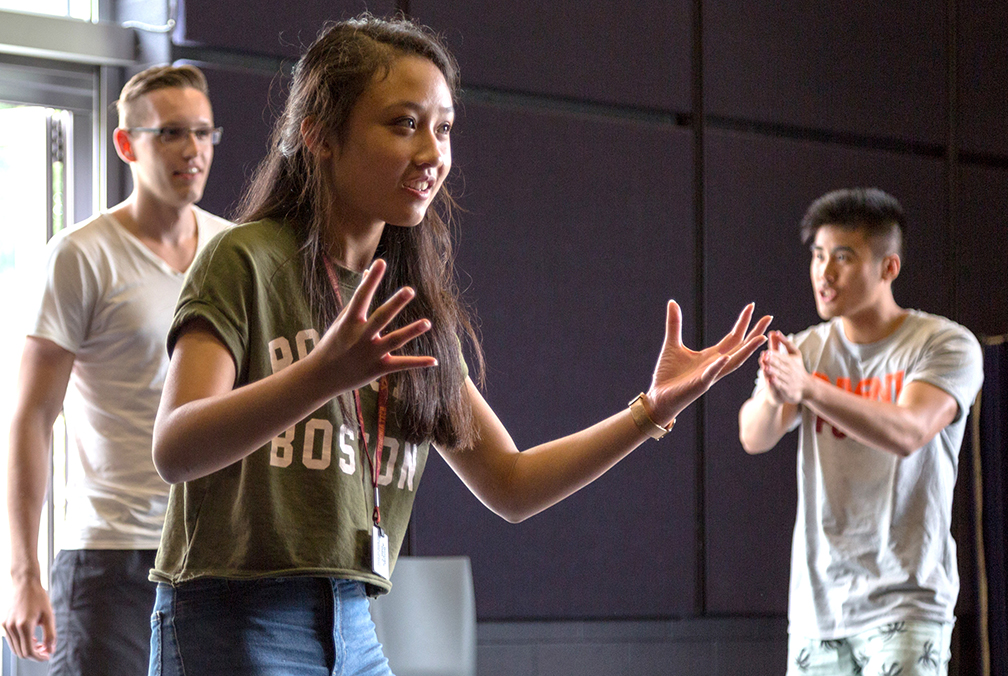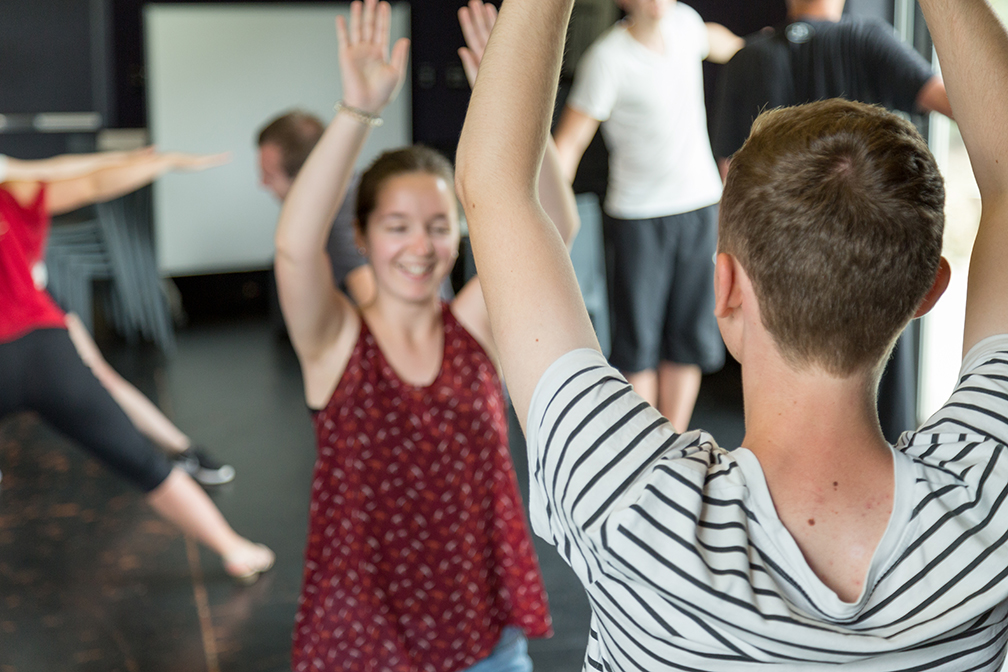Communicating Science Course Serves as Cornerstone of German Fulbright Summer Institute
August 14, 2017

Can theatre exercises help with communication? Patricia Raun, a theatre professor in the School of Performing Arts, says they can.
“I have taught acting at Virginia Tech to people outside of the theatre for decades,” said Raun, who is also the director of the Center for Communicating Science, which is housed in the Institute of Society, Culture, and Environment. “I’ve seen theatre exercises and improvisation develop empathy, spontaneity, and connection with others across differences in many, many other people.”
Raun and Carrie Kroehler, associate director of the Center for Communicating Science, teach a graduate-level course on communicating science.
“We use theater improv exercises and writing exercises and all sorts of fun games to help people learn to communicate and connect better,” Kroehler said.
The graduate course debuted in the spring of 2012 and has become the inspiration for the German Fulbright Summer Institute. Organized by the Cranwell International Center, the summer institute was held at Virginia Tech from July 23 to August 11. Titled “Communicating Science: Communication, Collaboration, and Connection Across Differences and Disciplines,” the program engaged 24 German undergraduate students in academic courses, co-curricular site visits, and extracurricular activities.
The German-American Fulbright Commission decided to hold the program at Virginia Tech after Cranwell’s Associate Dean of Students and Director David Clubb visited Germany in the fall of 2015.
“I went on a program for international education administrators,” Clubb said. “You go to lots of different universities in Germany; you meet with lots of government and educational leaders. So when you get back, there is some expectation that you’ll find ways to keep working together.”
Clubb proposed a grant to bring the Fulbright Summer Institute to Virginia Tech and got the funding in November 2016. Since then, he and his staff at Cranwell, along with Raun and Kroehler, were planning up until the German undergraduates arrived.
“[The] whole schedule was probably a year in the making,” Clubb said. “It took quite a few iterations.”
Clubb knew there had to be an English component of the program and another core academic anchor course. Clubb ran into Kroehler at Cranwell, who told him about the graduate-level Communicating Science course.
“I think it immediately spoke to him because all these students were going to be coming from applied colleges in Germany,” Kroehler said. “So many of them are doing technical things, which they’re going to be applying, not just living in their little research worlds.”
Both Kroehler and Raun were excited to become a part of the Fulbright Summer Institute because they were proposing to create the Center for Communicating Science around that time. Raun and Kroehler came up with a new curriculum for the Fulbright students.
“It is not simply us teaching several hours a week. This experience is a three-week, 24/7 experience for them,” Raun said. “This is a comprehensive practice-based experiential learning process for us and for them that does not begin at the beginning of class and end at the end of class.”
“I always have a hard time explaining to people what I’m actually doing. And especially when you’re becoming an engineer, it’s very important that you are able to explain to people outside of your field, too, what you are doing,” Wurzel said.
Alongside the Communicating Science course, an advanced English as a Second Language course was taught by instructor Aniseh Ghaderi of the Language and Culture Institute.
“These students have talked happily about their activities in the Communicating Science course, finding it both stimulating and novel,” Ghaderi said. “The Scientific and Technical Writing course complements the Communicating Science course in that STW examines the ways that written communications work in academia and subsequent professional activities.”
Beyond the academic courses, the students had plenty of fun on campus. They said Virginia Tech is much different than where they study in Germany.
“I think [the] school spirit is very admirable, that you connect that well to your school,” Wurzel said. “And that’s something I can really relate to because we don’t have that sort of school spirit in Germany.”
Over the three weeks, Kroehler and Raun noticed a change in the students.
“They have gone from being reserved to being more really connecting with one another and [others],” Kroehler said. “I think they have all expressed learning things about themselves that they didn’t know and discovering things that they’re happy to discover.”
Clubb hopes to hold the summer institute at Virginia Tech again next year.
“That’s the exciting part … I think it can really get some visibility and traction,” Clubb said. “If it’s here for three to five years, that’s a pretty good amount of time doing something again and again. I’m anticipating that we’ll get good reviews. And you’ll see another group of 24 students here next year.”
In the meantime, Raun and Kroehler look forward to continue teaching students how to communicate, collaborate, and connect.
“Our goal is to help people become more personal, more direct, more spontaneous, and more responsive,” Raun said.
Photos, video, and story by Olivia Coleman









